Research
Research in the Krementsov laboratory is focused on understanding the molecular mechanisms underlying the pathogenesis of immune-mediated or infectious diseases. We use unique mouse genetics approaches together with immunologic, cellular, molecular, and genomic approaches to assess the role of genes and environment in immune-mediated and infectious diseases.
Overview
Genetics of multiple sclerosis
One of our principal interests is the autoimmune disease multiple sclerosis (MS), the most common neurologic disorder affecting young adults, which occurs when the immune system aberrantly initiates an attack against the central nervous system.
The etiology of autoimmune diseases, such as MS, is complex and multifactorial, dictated by genetic and environmental risk factors. The mechanisms of these risk factors are difficult to determine in human studies.
A major current focus is the identification of a genetic basis for inter-individual heterogeneity in disease progression in MS. Our recent studies leveraged a genetically diverse mouse model called the Collaborative Cross to identify unique neuroimmunologic phenotypes and genetic determinants of disease heterogeneity in a model of MS.
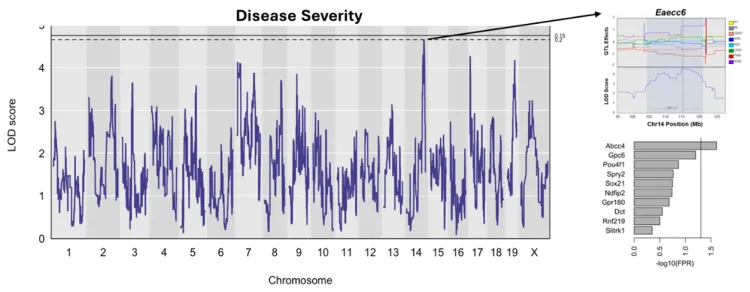
Gut microbiome in multiple sclerosis
Another major focus is the gut microbiome, as a novel putative risk factor for MS and many chronic diseases. Our studies have identified complex host-gut microbe interactions driving CNS autoimmune disease via the production of specific bacterial metabolites derived from host dietary substrates like tryptophan or fiber. We have also collaborated with the Yang lab at OMRF to identify gut microbial signatures of MS progression in humans.
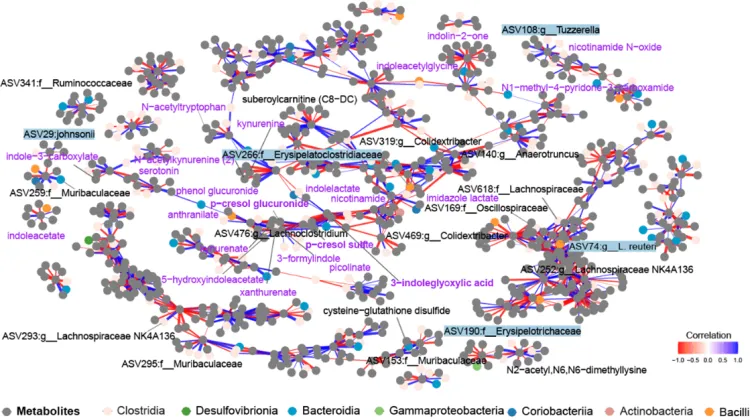
Host genetics of anti-viral immunity
Other interests in the lab include genetics of host-microbe interactions, especially viruses, with a recent focus on gammaherpesvirus infection, which represents the major environmental risk factor for MS. We have discovered that wild-derived PWD mice are highly resistant to gammaherpesvirus infection because of their unique anti-viral immune responses, and we are now working to map the genes driving this resistance.

Genetic mechanisms regulating acute inflammation and sepsis
We recently discovered a hidden open reading frame in long non-coding RNA gene, which encodes a novel secreted protein that may regulate acute inflammatory responses in systemic infection or sepsis. We are currently working to understand the cell biology of this protein.
We have also taken a genome-wide approach to understand how natural genetic variation controls transcriptional responses and host survival in septic shock.
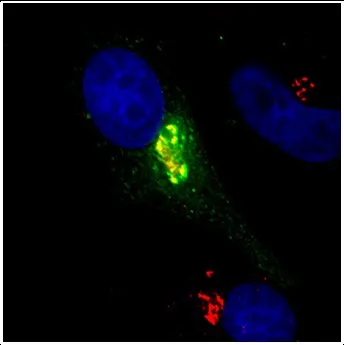
Sex differences in immunity
MS is three times more prevalent in women, but more severe in men, and our research is also aimed at understanding why and how MS affects women and men differently. This line of investigation has uncovered a druggable molecular pathway in macrophages and microglia, which is regulated by estrogen.
We are also highly interested in gene-by-sex interactions, we which we have found in both autoimmune and infectious diseases.
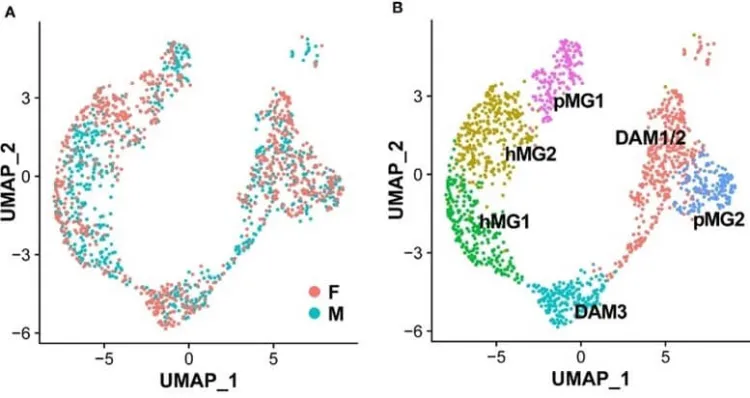
Lab Highlights
Selected Recent Publications
2025
Sabikunnahar B, Snyder JP, Rodriguez PD, Sessions KJ, Amiel E, Frietze SE, Krementsov DN. Natural genetic variation in wild-derived mice controls host survival and transcriptional responses during endotoxic shock. Immunohorizons. 2025 Mar 26;9(5):vlaf007. doi: 10.1093/immhor/vlaf007.
2024
Nelson EA, Tyler AL, Lakusta-Wong T, Lahue KG, Hankes KC, Teuscher C, Lynch RM, Ferris MT, Mahoney JM, Krementsov DN. Analysis of CNS autoimmunity in genetically diverse mice reveals unique phenotypes and mechanisms. JCI Insight. 2024 Nov 8;9(21):e184138. doi: 10.1172/jci.insight.184138.
Identification of commensal gut microbiota signatures as predictors of clinical severity and disease progression in multiple sclerosis. Montgomery TL, Wang Q, Mirza A, Dwyer D, Wu Q, Dowling CA, Martens JWS, Yang J, Krementsov DN*, Mao-Draayer Y*. Sci Rep. 2024 Jul 3;14(1):15292. doi: 10.1038/s41598-024-64369-x.
Montgomery TL, Toppen LC, Eckstrom K, Heney ER, Kennedy JJ, Scarborough MJ, Krementsov DN. Lactobacillaceae differentially impact butyrate-producing gut microbiota to drive CNS autoimmunity. Gut Microbes. 2024 Jan-Dec;16(1):2418415. doi: 10.1080/19490976.2024.2418415. Epub 2024 Oct 27.
2023
Holt EA, Waytashek CM, Sessions KJ, Asarian L, Lahue KG, Usherwood EJ, Teuscher C, Krementsov DN. Host Genetic Variation Has a Profound Impact on Immune Responses Mediating Control of Viral Load in Chronic Gammaherpesvirus Infection. J Immunol. 2023 Nov 15;211(10):1526-1539. doi: 10.4049/jimmunol.2300294.
Sabikunnahar B, Caldwell S, Varnum S, Hogan T, Cooper A, Lahue KG, Bivona JJ, Cousens PM, Symeonides M, Ballif BA, Poynter ME, Krementsov DN. Long Noncoding RNA U90926 Is Induced in Activated Macrophages, Is Protective in Endotoxic Shock, and Encodes a Novel Secreted Protein. J Immunol. 2023 Jan 27:ji2200215. doi: 10.4049/jimmunol.2200215. PMID: 36705532.
2022
Montgomery TL, Eckstrom K, Lile KH, Caldwell S, Heney ER, Lahue KG, D'Alessandro A, Wargo MJ, Krementsov DN. Lactobacillus reuteri tryptophan metabolism promotes host susceptibility to CNS autoimmunity. Microbiome. 2022 Nov 23;10(1):198. doi: 10.1186/s40168-022-01408-7. PubMed PMID: 36419205.
Sabikunnahar B, Lahue KG, Asarian L, Fang Q, McGill MM, Haynes L, Teuscher C, Krementsov DN. Sex differences in susceptibility to influenza A virus infection depend on host genotype. PLoS One. 2022;17(9):e0273050. doi: 10.1371/journal.pone.0273050. eCollection 2022. PubMed PMID: 36112601.
Snyder, J. P., S. K. Gullickson, R. del Rio-Guerra, A. Sweezy, B. Vagher, T. C. Hogan, K. G. Lahue, J. A. Reisz, A. D’Alessandro, D. N. Krementsov*, and E. Amiel*. 2022. Divergent genetic regulation of nitric oxide production between C57BL/6J and wild-derived PWD/PhJ mice controls postactivation mitochondrial metabolism, cell survival, and bacterial resistance in dendritic cells. J Immunol. 2022 Jan 1;208(1):97-109. doi: 10.4049/jimmunol.2100375. PubMed PMID: 34872978
2021
McGill MM, Richman A, Boyd J, Sabikunnahar B, Lahue KG, Montgomery TL, Caldwell S, Varnum S, Frietze S and Krementsov DN. p38 MAP Kinase Signaling in Microglia Plays a Sex-Specific Protective Role in CNS Autoimmunity and Regulates Microglial Transcriptional States. Front Immunol. 2021 Oct 11;12:715311. doi: 10.3389/fimmu.2021.715311. PMID: 34707603
Blais LL, Montgomery TL, Amiel E, Deming PB, Krementsov DN. Probiotic and commensal gut microbial therapies in multiple sclerosis and its animal models: a comprehensive review. Gut Microbes. 2021 Jan-Dec;13(1):1943289. doi: 10.1080/19490976.2021.1943289. PMID: 34264791
2020
Montgomery T, Künstner A, Kennedy JJ, Fang Q, Asarian L, Culp-Hill R, D’Alessandro A, Teuscher C, Busch H, Krementsov DN. Interactions between host genetics and gut microbiota determine susceptibility to CNS autoimmunity. Proc Natl Acad Sci U S A. 2020 Oct 19;202002817. Commentary on the article is here.
Lahue KG, Lara MK, Linton AA, Lavoie B, Fang Q, McGill MM, Crothers JW, Teuscher C, Mawe GM, Tyler AL, Mahoney JM, Krementsov DN. Identification of novel loci controlling inflammatory bowel disease susceptibility utilizing the genetic diversity of wild-derived mice. Genes and Immunity. (2020).
McGill MM, Sabikunnahar B, Fang Q, Teuscher C, Krementsov DN. The sex-specific role of p38 MAP kinase in CNS autoimmunity is regulated by estrogen receptor alpha. J Neuroimmunol. 2020 Mar 4;342:577209.
News
November 2025 - Theresa Montgomery’s research was highlighted in a recent UVM Q&A feature.
April 2025 – Congratulations to Courtney Waytashek on her appointment to the Vermont Immunology and Infection Disease T32 training grant!
April 2025 – Courtney and Katherine travel to Glasgow to attend the Internation Mammalian Genome Society Conference to give oral presentations on their research and explore Scottish castles and highlands.
March 2025 – Exciting funding news: the lab has been awarded two research grants: a 3-year research grant from the National MS Society to study gut bacterial metabolism in MS, and a 2-year R03 grant from NIAID to characterize a novel small protein encoded by a hidden ORF.
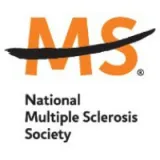
March 2025 – Congratulations to Theresa Montgomery for being awarded the prestigious 3 years postdoctoral Tykeson fellowship from the National MS Society!
December 2024 – Emily Nelson (formerly Holt) is now the 3rd member of the Krementsov lab to defend her PhD, just on the heels of her second 1st author publication in JCI Insight.
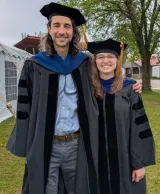
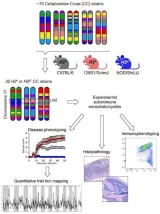
May 2024 –Tyler Hogan, Ph.D. candidate in the CMB program joins the Krementsov lab to keep our orphan ORF project alive!
April 2023 – A warm welcome to our newest team member – Courtney Waytashek, a Ph.D. student in the CMB program!
March 2023 – Congrats to Bristy, on her successful Ph.D. defense! She is the second PhD from our lab! Nice timing with the publication of her masterpiece manuscript in JI, also featured in JI’s top reads!
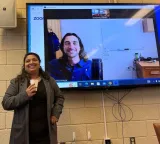
February 2023 – Emily and Theresa meet Dimitry in San Diego for the ACTRIMS conference. Theresa was awarded a travel grant and Emily’s talk was nominated for best presentation by a young investigator!
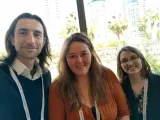
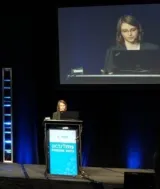
January – June 2023 – Dimitry leaves Vermont’s winter behind to spend a 6 month sabbatical working with Rob Knight’s lab at UC San Diego, learning more about microbiome analysis and bioinformatics pipelines, and exploring the great outdoors in California in his spare time.
July – October 2022 – Sad goodbye to Karrie Lahue who accepted a new administrative position at UVM biosafety, and a warm welcome to two new technicians: Tyler Hogan and Katherine Sessions!
September 2022 – It’s official – we have a new R01 grant from NIAID to use the Collaborative Cross mouse model to study genetics of disease course heterogeneity in MS! Special thanks to Emily Holt and Karrie Lahue for their ideas and efforts on this project.
August 2022 – Congratulations to Dr. Montgomery on her successful PhD defense! The first, but certainly not the last PhD from our lab! Theresa’s 3rd first author paper from our lab followed shortly…
May 2022 – Emily, Theresa, and Dimitry represent UVM by presenting their work at the Annual AAI meeting in Portland.
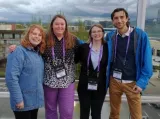
May 2022 – Welcome to the newest ex officio DK lab member, baby Amaya! Congratulations to proud parents Bristy and Somen!
May 2022 – Congratulations to Sydney Caldwell for not only successfully defending her DUR Honors Thesis, but also receiving the Outstanding Senior in Molecular Genetics Award! We are sad to see you go!
August 2021 – Eelcome to the newest DK lab members, Dan Peipert, Benjamin Liebman, and Eamonn Heney! Sad goodbyes to Mahalia, Lorrie, and Stella!
July 2021 – Big congrats to Theresa - her F31 fellowship from NINDS is now officially funded!
July 2021 – Lorrie’s (unofficially systematic, and certainly comprehensive) review is now published in Gut Microbes. A labor of love!
June 2021 – Our report on unintentional contamination of lab personnel by SARS-CoV-2 DNA plasmids causing false positive RT-PCR surveillance is now published in J Clin Micro. Special thanks to Drs. Jess Crothers and Michelle Paavola for their efforts on this.
November 2020 – Several lay press features are published highlighting Theresa’s microbiome paper. Here is one.
November 2020 – 2 papers published: Karrie and Montana’s paper on genetics of IBD in Genes and Immunity, and Theresa’s paper on microbiome in a mouse model of MS, in PNAS!
May 2020 - Welcome to our newest PhD candidate, Emily Holt!
March-May 2020 – During the COVID-19 University shutdown, Karrie, Mahalia, Theresa, and Bristy stay on the frontline to keep essential activities in the lab running!
March 2020 – Mahalia and Bristy’s paper published in Journal of Neuroimmunology.
December 2019 – Theresa invited to participate in the ACTRIMS Young Scientist Summit to be held January 2020 in Austin, Texas.
Fall 2019 – The NIAID and National MS Society co-fund our new approach to mapping the genetic basis of MS disease course heterogeneity using a new systems genetics approach – the Collaborative Cross.
August 2019 – Theresa appointed to the VCIID T32 training grant
June 2019 – M.S. candidate Grace Voorhees successfully defends her Master's Thesis, making her the first DK lab graduate!
May 2019 – Four members of the lab present at the 2019 American Association of Immunologists Annual Meeting in San Diego. Theresa selected for oral presentation and trainee abstract award.
May 2018 – welcome to two new Ph.D. candidates: Bristy Sabikunnahar and Theresa Montgomery!
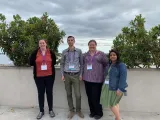
December 2017 – Krementsov lab finally moves into their newly renovated space in Rowell!

August 2017 – Dimitry begins his new appointment in the department of Biomedical and Health Sciences.
Funding
The Krementsov Lab receives funding from the National Institutes of Health (NIH) National Institute of Allergy and Infectious Diseases, the National Multiple Sclerosis Society, and the NIH National Institute of Neurological Disorders and Stroke.

Lab Members
Current Lab Members
Principal Investigator
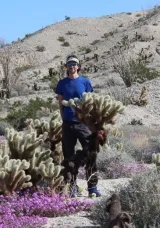
Dimitry N. Krementsov, Associate Professor, Department of Biomedical and Health Sciences
Dimitry was initially trained as a molecular biologist, later picking up virology, immunology, and a bit of genetics along the way. He believes that biology makes the most sense when viewed through the lens of evolution (Dobzhansky, 1973). In addition to research, Dimitry is passionate about teaching immunology and microbiology at the undergraduate and graduate levels.
Link to Dimitry’s faculty page
Postdocs and Fellows
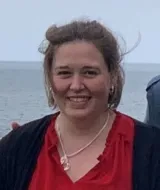
Theresa Montgomery, Ph.D.
National MS Society Tykeson Postdoctoral Fellow
Email: Theresa.Montgomery@uvm.edu
Theresa works on host-microbiome interactions in autoimmune disease and is skilled in anaerobic culture and bioinformatics.

Emily Nelson, Ph.D.
Postdoctoral Associate
Email: Emily.A.Holt@uvm.edu
Emily continues her Ph.D. work on genetic heterogeneity in MS disease progression as a short-term postdoc.
Staff
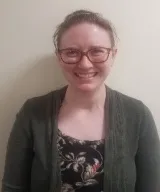
Katherine Sessions, M.S.
Laboratory Research Technician Senior
Email: katherine.sessions@med.uvm.edu
Katherine applies the Collaborative Cross mouse model to study MS progression and environmental risk factors.
Ph.D. Students

Dan Peipert, B.S.
NGP Program
Email: dpeipert@uvm.edu
Dan investigates gut commensal microbes in MS models, in particular Akkermansia muciniphila.

Courtney Waytashek, B.S.
CMB Program
Email: Courtney.waytashek@uvm.edu
Courtney studies host genetic and immunologic factors in gammaherpesvirus replication control.

Tyler Hogan, B.S.
CMB Program
Email: tyler.hogan@uvm.edu
Tyler works on the biology of a novel secreted protein that regulates sepsis.
Undergraduate Researchers and Medical Students

Julia Young, Microbiology, Class of 2026 – Studying functional consequences of Nos2 gene variants.

Margaret (Meg) Lee, Microbiology, Class of 2026 – Researching Akkermansia muciniphila interactions with the host.

Kaylin Dahlberg, Biochemistry, Class of 2027 – Investigating genetic variation and gammaherpesvirus resistance.

Caitlin McManus, Molecular Genetics, Class of 2027 – Culturing gut commensals to study metabolic influence on host.

Maya Friday, Microbiology, Class of 2028 – Working on gut commensals relevant to MS.
Lera Degteva, Molecular Genetics, Class of 2028 – Studying gammaherpesvirus infection and CNS autoimmunity.
Lauren Downs, Biomedical Engineering, Class of 2026 – Studying how natural genetic variation regulates neuropathology in autoimmune disease.
Jack Finn, Medical student, Class of 2027 – Studying genetics of optic neuritis.
Alumni & Former Lab Members
Lab Alumni and their Current Positions

Katarina Lile
Degree: B.S. in Microbiology, 2021–2025
Current Position: Ph.D. Candidate, Biological and Biomedical Sciences, Yale University

Tia Brodeur, M.D., Ph.D.
Fellowship: Reproductive Endocrinology and Infertility Fellow, 2020–2023
Current Position: Assistant Professor, University of Missouri
Visit her lab webpage
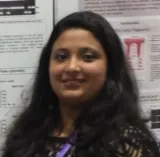
Bristy Sabikunnahar, Ph.D.
Ph.D.: 2018–2023
Current Position: Postdoctoral Fellow, Stevens Lab, Harvard Medical School

Eamonn Heney
Degree: B.S. in Biological Sciences, 2020–2023
Current Position: Medical Assistant, San Francisco, CA

Karrie Lahue
Role: Senior Laboratory Technician and “Lab Mom”, 2017–2022
Current Position: Director, Office of Animal Care Management (OACM), University of Vermont
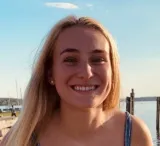
Sydney Caldwell
Degree: B.S. in Molecular Genetics, 2018–2022
Current Position: PhD Candidate, Harvard Medical School

Benjamin Liebman
Role: Laboratory Technician, 2021–2022
Current Position: M.D./Ph.D. Candidate, University of California, San Diego (UCSD)
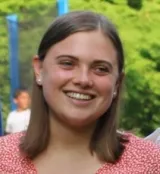
Stella Varnum
Degree: B.S. in Biochemistry, 2018–2021
Current Position: Ph.D. Candidate in Immunology, Washington University in St. Louis
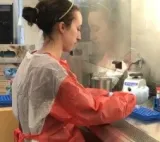
Lorrie Blais
Degree: M.S. in Medical Laboratory Science, 2021
Current Position: Scientist, Vermont Department of Health Laboratories

Mahalia McGill
Role: Laboratory Technician, 2015–2021
Current Position: Field Application Specialist, BioTek/Agilent

Josie Kennedy
Degree: B.S. in Medical Laboratory Science, 2020
Current Position: Medical Laboratory Scientist, Massachusetts General Hospital (MGH)

Grace Voorhees
Program: M.S. in Pharmacology, 2019
Current Position: Senior Research Associate, Cygnal Therapeutics
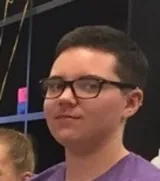
Alexei “Coop” Cooper
Role: Laboratory Technician, 2017–2018
Current Position: Ph.D. Program in Molecular and Cell Biology (MCB), University of Connecticut (UConn)